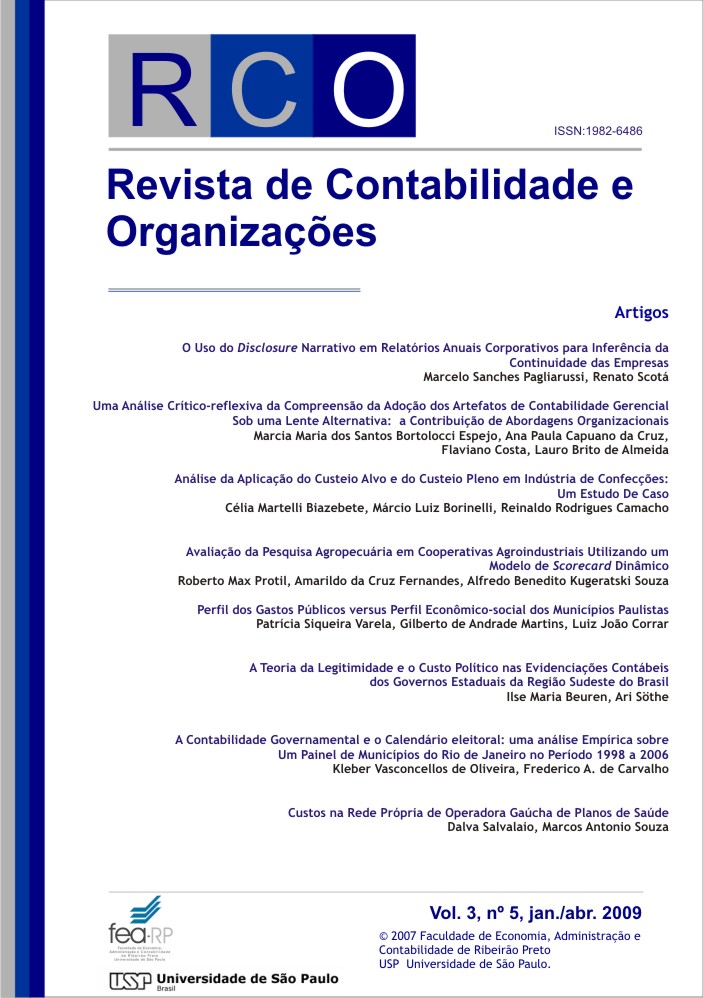Government accounting and electoral agenda in Rio de Janeiro, Brazil: an empirical analysis of a panel of municipalities during 1998 - 2006
DOI:
https://doi.org/10.11606/rco.v3i5.34735Keywords:
Government Accounting, political cycles, regression with panel dataAbstract
Based on the theory of political-economic cycles this paper investigates accounting data relatied to municipal governments in Rio de Janeiro, Brazil, aiming to detect whether mayors displayed cyclical behavior during the period 1998-2006, including electoral years 2002 and 2006. Using panel data corresponding to a convenience sample including forty municipalities, allowed the selected variables from municipal budgets and balance sheets to be analyzed using a linear regression framework. Findings suggest that electoral agendas cyclically impact in a significant way upon mayor behavior. For some expenditure items cyclical manipulations coincided with electoral years and seem to indicate that mayors are indeed prone to helping their parties both in executive and parliamentary elections, either in state or national levels. However the partisan coincidence between mayors and either governors or the president has shown a negative relationship so that their revealed behavior points in fact to a substitution among government levels.Downloads
Downloads
Published
Issue
Section
License
The RCO adopts the Free Open Access policy, under the standard Creative Commons agreement (CC BY-NC-ND 4.0). The agreement provides that:
- Submission of text authorizes its publication and implies commitment that the same material is not being submitted to another journal. The original is considered definitive.
- Authors retain the copyright and grant the journal the right of first publication, with the work simultaneously licensed under the Creative Commons Attribution License which allows the sharing of the work with acknowledgment of authorship and initial publication in this journal.
- Authors are authorized to take additional contracts separately, for non-exclusive distribution of the version of the work published in this journal (e.g. publish in an institutional repository or as a book chapter), with necessary recognition of authorship and initial publication in this journal.
- Authors are allowed and encouraged to publish and distribute their work online (e.g. in institutional repositories or on their personal page) before or during the editorial process, as this can generate productive changes as well as increase the impact and citation of published work (See The Effect of Free Access).
- The journal does not pay copyright to the authors of the published texts.
- The journal's copyright holder, except those already agreed in the Free Open Access Agreement (CC BY-NC-ND 4.0), is the Accounting Department of the Faculty of Economics, Administration and Accounting of Ribeirão Preto of the University of São Paulo.
No submission or publication fees are charged.
Up to 4 authors per article are accepted. Exceptionally duly justified cases may be reviewed by the Executive Committee of the RCO. Exceptional cases are considered as: multi-institutional projects; manuscripts resulting from the collaboration of research groups; or involving large teams for evidence collection, construction of primary data, and comparative experiments.
It is recommended that the authorship be ordered by contribution of each of the individuals listed as authors, especially in the design and planning of the research project, in obtaining or analyzing and interpreting data, and writing. Authors must declare the actual contributions of each author, filling the letter to the editor, at the beginning of the submission, taking responsibility for the information given.
Authors are allowed to change throughout the evaluation process and prior to the publication of the manuscript. The Authors should indicate the composition and final order of authorship in the document signed by all those involved when accepted for publication. If the composition and authoring order is different than previously reported in the system, all previously listed authors should be in agreement.
In the case of identification of authorship without merit or contribution (ghost, guest or gift authorship), the RCO follows the procedure recommended by COPE.








